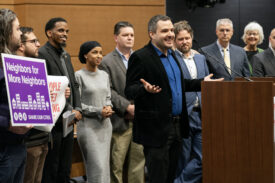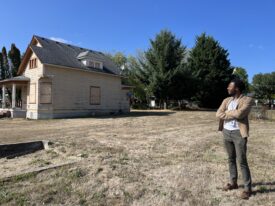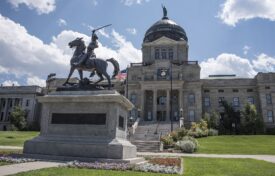A couple of notable news stories BC got lost in the shuffle of a busy week.
First up, there’s this news from the Vancouver Sun: apparently, some regional planners are taking a skeptical look at the so-called Gateway Program, which would expand the highway system in the lower mainland. According to UBC professor William Rees, the project will foster low-density suburban development—an increasingly dicey prospect in an era of rising gas prices:
Rees, who is among a number of prominent planners and academics attending the World Planners Congress in Vancouver this week, said urban planning is largely based on the misguided belief that cheap energy will be around forever.
The Gateway Program, which includes expanding Highway 1 and twinning the Port Mann bridge, will exacerbate land use patterns that will become unsustainable as gas prices rise sharply in coming years, he said.
Second, and on a related note, there’s this Georgia Straightarticle by the redoubtable Patrick Condon about a possible next step for Vancouver’s urban development: bringing back the streetcar neighborhood, with low-rise (but still somewhat dense) development along the streetcar arterials first laid out in the early 20th century:
Amazingly, if only the first parcels fronting our arterials (from the street to the lane only) were built out to the originally imagined four storeys, you could almost double the population of the city while not changing the amount and nature of the commercial services on the first floor. This would affect only a small percentage of all land in the city; in most cases, the zoning is already in place for this. [Emphasis added]
Hm. So greater Vancouver could spend billions to expand highways at the outskirts of town, facilitating low-density, auto-dependent sprawl; or it could accomodate nearly half a million new residents through low-rise development. I’ve got no idea which road Vancouver will choose—but I know which one is more energy efficient.








Jan
“a possible next step for Vancouver’s urban development: bring back the streetcar neighborhood, with low-rise (but still somewhat dense) development along streetcar arterials”The snide “somewhat dense” comment is a bit out of line. Four-story density would be a HUGE improvement in most areas! Note that high-rise apartments are NOT particularly sustainable, with their dependence on elevators and central heating/cooling systems.In the ’70’s, Christopher Alexander wrote “There is abundant evidence to show that high buildings make people crazy,” feeling so strongly about it that he named it one of 251 fundamental patterns of architecture (#21: Four Story Limit).So lighten up on the “somewhat dense” rhetoric, guys—four storys would still be FOUR TIMES as much density as our current strip-mall/subdivision culture!